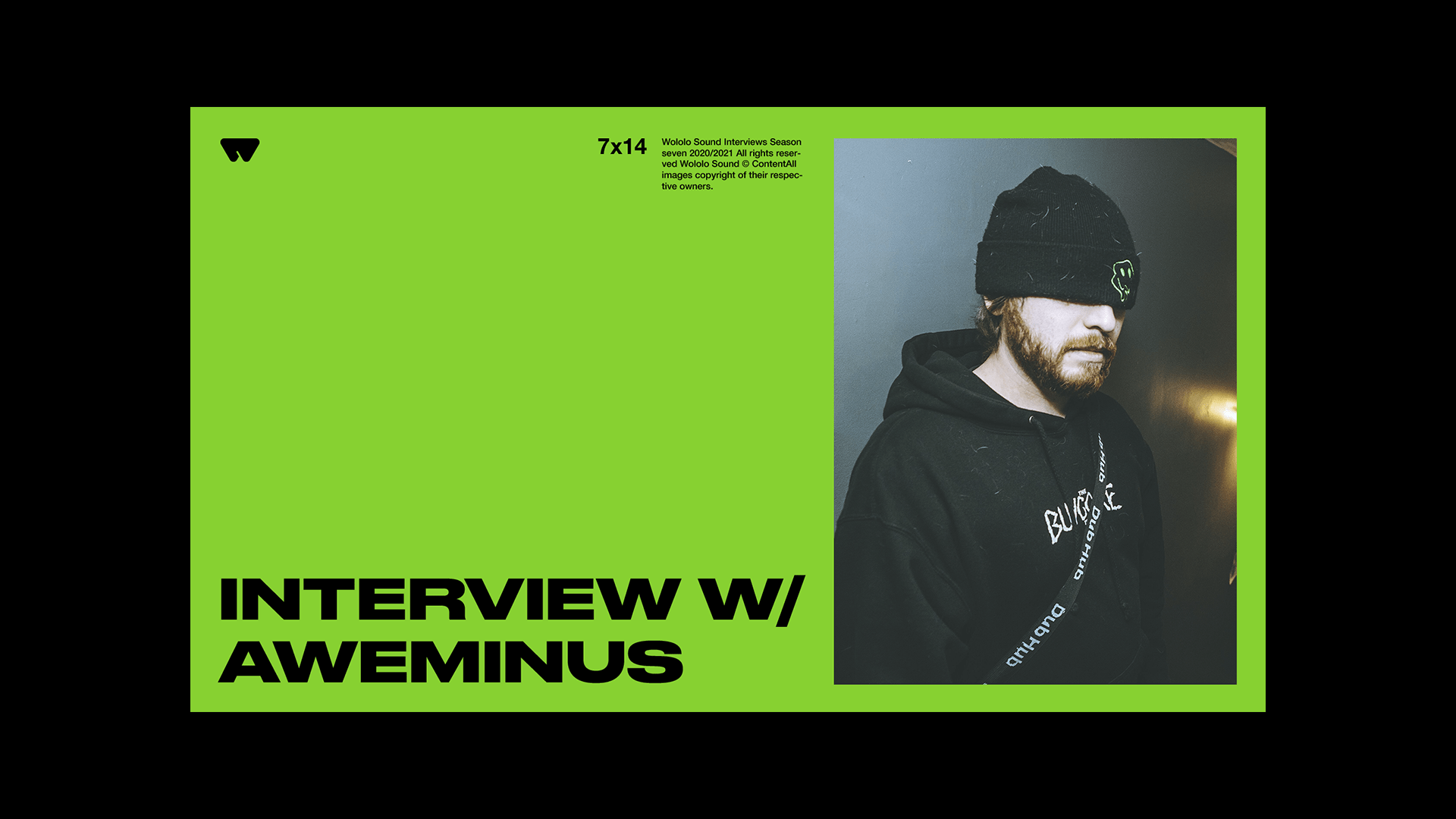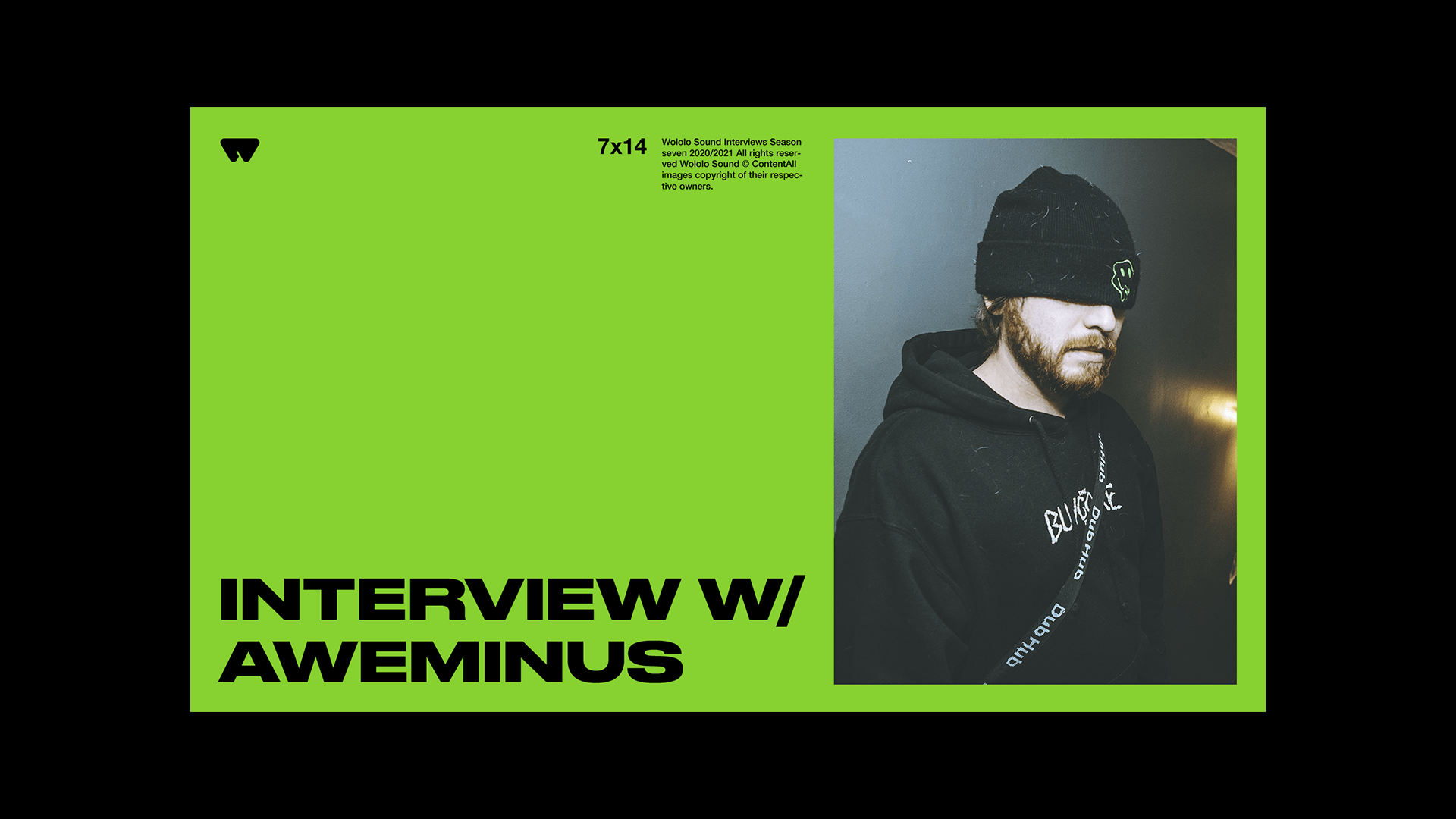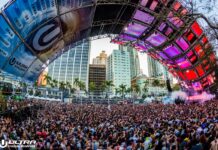Hablamos con uno de los artistas de riddim del momento: Aweminus nos cuenta sobre su carrera, la situación actual del dubstep, el futuro del género y mucho más.

Wololo Sound: ¡Hola Brandon! Gracias por cedernos tu tiempo para esta entrevista. Esperamos que tú y tus familiares estéis bine. ¡Vamos con ello! Para aquellos que no te conozcan, háblanos un poco sobre el proyecto de Aweminus. ¿Cómo te adentraste en este mundillo? ¿De donde viene el nombre de “Aweminus”?
Aweminus: Con 15 años ya había estado produciendo música en mi ordenador durante 3 años. No era demasiado buena pero decidí que quizá debería intentarlo y crearme un nombre. El Brandon de 15 años sólo buscaba sinónimos de “oscuro”, y encontré “ominous”. Cambié un par de letras y aquí estamos ahora con “Aweminus”.
Wololo Sound: Hello Brandon! Thank you for giving us your time for this interview. We hope you and your relatives are doing great. Let’s go with it! For those who do not know you, tell us a little bit about the Aweminus project. How did you enter this world? Where does the “Aweminus” name come from?
Aweminus: At 15 years old I had already been writing music on my computer for about 3 years. It wasn’t very good but I decided maybe I should try and make a name for myself. 15 year old Brandon just looked up synonyms of dark, and found ominous. Switched up a few letters and now here we are with “Aweminus”.
WS: Con tan sólo 16 años te proclamaste ganador, junto a MineSweepa y Hugeative, en el concurso oficial de remixes a ‘Fallout’, de Getter. ¿Cómo impactó esto en tu vida personal y en tu carrera como artista?
A: Personalmente, estaba flipándolo en colores. Getter era uno de mis artistas favoritos de dubstep por aquel entonces. Él estaba llevando el nuevo sonido del dubstep a otro completo nivel y yo admiraba mucho su música. En aquel momento estaba hablando con muchos de mis productores favoritos enviando música de aquí para allá. Ese fue realmente un momento mágico para mí, y para el género. Saludos a MineSweepa, por cierto.
WS: Being only 16 years old, you won along with MineSweepa and Hugeative the official remixes contest of ‘Fallout’, by Getter. How did this impact your personal life and your career as an artist?
A: Personally, I was GASSED AF. Getter was one of my favorite dubstep artists at the time. He was taking the new sound of Dubstep to the absolute next level and I really looked up to his music. At that point I was talking with so many of my favorite producers sending music back and forth and what not. That was really a magical time for me, and for the the genre. s/o MineSweepa btw.
WS: Este 2020 ha sido un gran año para ti. No hemos dejado de ver lanzamientos tuyos como ‘vibevibevibe’, ‘Get It’, ‘Stogned’ o tu nuevo EP ‘UGHH’. ¿Crees que te encuentras en el mejor momento de tu carrera o consideras que aún te queda camino para llegar a tu meta?
A: Quiero decir… con la forma en que están las cosas este año ha sido tan bueno como ha podido, la verdad. Obviamente con la pandemia y demás mi carrera en la música no está yendo exactamente como planeaba pero aun así estoy extremadamente feliz de cómo están yendo las cosas igualmente. Estoy muy feliz con la música.
Estoy sacando música este año y también mucha (lo creáis o no, siempre he escrito toda esta cantidad de música). Un gran saludo al equipo de SLYVLL.
WS: This 2020 has been a great year for you. We haven’t stopped seeing releases from you like ‘vibevibevibe’, ‘Get It’, ‘Stogned’ or your new EP ‘UGHH ’. Do you think that you are in the best moment of your career or do you consider that you still have a long way until reaching your goal?
A: I mean… with the way things are this year It’s as good as it can get, really. Obviously with the pandemic and all my career in music isn’t exactly going as planned but I’m still extremely happy with the way things are going anyway. I’m really happy with the music
I’m releasing this year and also how much music I’m releasing (Believe it or not, I’ve always written this much music). Major shout out to the team at SLYVLL.
WS: Es abrumadora la cantidad de sellos discográficos con los que has trabajado: Savage Society, Bassrush, Prime Audio, ahora Halcyon… pero sobre todo con NSD: Black Label. ¿Cuáles son los pros y los contras de no trabajar con un único sello? ¿Qué encuentras en la familia de Never Say Die que no tienen los demás?
A: Saludos a NSD: Black Label y Halcyon. Los lanzamientos habrían sido muy atrasados si no fuera por esos dos sellos este año. He estado trabajando en NSD: Black Label por un tiempo ya. Tuve muchos lanzamientos con ellos, y me encanta trabajar con ellos. Si no esta roto, no lo arregles, ¿no? Halcyon es, por supuesto, el sello de Oolacile. Muy buen amigo mío y me mola la visión que hay tras el sello.
WS: It is overwhelming the number of labels you have worked with: Savage Society, Bassrush, Prime Audio, Halcyon now… but mostly NSD: Black Label. What are the pros and cons of not working with a unique label? What do you find in Never Say Die that the others don’t have?
A: Shout out to NSD: Black Label and Halcyon. Releases would have been wayyy backed up without those two labels this year. I’ve been working with NSD: Black Label for quite some time now. Had a lot of releases with them, and I love working with them. If it ain’t broken don’t fix it right? Halcyon is, of course, Oolacile’s label. Very good friend of mine and I fux with the vision behind his label.
Wololo Sound entrevista a Oolacile
WS: Aunque últimamente hay más artistas femeninas en el género, son muy pocas las mujeres productoras y DJs de dubstep conocidas. ¿Podrías hablarnos un poco sobre cómo se ve y trata esta situación desde dentro de la industria?
A: Es genial ver a gente tan diferente haciendo dubstep a día de hoy. Me encanta. ¡Hay un montón de productoras femeninas y LGBTQ nuevas rompiéndolo ahora y me encanta esa diversidad!
WS: Although nowadays there are a lot of more women in the genre, there are not so many well-known feminine dubstep DJs and producers. Could you tell us a little bit about how this situation is seen and managed from the inside of the industry?
A: It’s very nice to see different kinds of people writing dubstep today. I love it. There’s lots of new Female and LGBTQ producers killing it nowadays and I’m loving the diversity!
WS: ¿Cómo ves tú que ha evolucionado el dubstep en los últimos 10 años? ¿Cómo crees que será dentro de 5? ¿Crees que para entonces se habrá vuelto un género mainstream o que habrá caído en el olvido?
A: El dubstep en sí simplemente está en una dimensión diferente al resto de géneros. Nunca ha encajado realmente con lo mainstream excepto por una breve moda hace un tiempo. No creo que necesite volverse mainstream para no morir. En los últimos 10 años el dubstep ha visto todo tipo de trato que un género puede tener. Fue una novedad, fue popular, la gente lo odió, la gente lo amó, la gente se olvidó de él. Supongo que me he mantenido con vida como una especie de bacteria extremófila intergaláctica. En cinco años tío, es difícil decirlo. El dubstep puede ser letal para entonces.
WS: How do you see that dubstep has evolved during the last 10 years? How do you think it will be in five years? Do you believe that by then it will have become a mainstream genre, or will it have been forgotten?
A: Dubstep as a whole is just in a different dimension from other genres. It’s never really fit in with the mainstream that much except for a short trend a while back. I don’t think it needs to be mainstream to not die. In the last 10 years dubstep has seen every sort of treatment a genre can have. It was a trend, It was popular, people hated it, people loved it, people forgot about it. It stayed alive like some extremophile intergalactic bacteria though. In 5 years tho man, It’s hard to say. Dubstep might actually be lethal by then.
WS: Este año, has quedado en el puesto #7 del TOP 100 Artistas Electrónicos de la comunidad de Wololo Sound, elaborado por los propios redactores y nuestros seguidores. Has sido el artista de dubstep/riddim que más alto ha quedado en la lista, entre artistas como David Guetta, Don Diablo, o Charlotte de Witte. Esto demuestra que el dubstep cada día tiene más presencia en nuestro país. ¿Has tenido algún contacto con la escena española a lo largo de tu carrera?
A: ¡No lo hecho! Me alegra que esté en lo cierto ahora. Es bueno ver que a la gente de España está empezando a gustarle el dubstep.
WS: This year, you are #7 in our TOP 100 Electronic Artists, created with the votes of Wololo Sound editors and followers. You have been the highest dubstep/riddim artist in the chart, among other artists such as David Guetta, Don Diablo or Charlotte de Witte. This demonstrates that every day dubstep is earning more and more presence in our country. Have you ever been in contact with the Spanish dubstep scene?
A: I haven’t! I’m glad I am right now. It’s good to see people in Spain are starting to like Dubstep.
WS: Ahora una pregunta que seguramente muchos de tus fans desean saber, ¿por qué no sacas más lanzamientos de jump up como tu remix a ‘Rise‘ de SVDDEN DEATH, puesto que es obvio que este género es uno de tus fuertes?
A: Sinceramente tuve momentos complicados lanzando temas de jump up con sellos en el pasado. Era muy vago como para hacerlo yo mismo y en parte simplemente dejé que esos temas se fueran a la basura desgraciadamente. Lo gracioso es que originalmente yo quería ser un productor de drum & bass. ¿Supongo que a día de hoy hacer dubstep es una experiencia más reconfortante? Simplemente he estado centrándome más en ese género durante los últimos dos años. Especialmente con el horario de lanzar música sin parar que he tenido este año eso lo he dejado apartado últimamente. Pero 100% no me he olvidado de él. De hecho hice un par de temas de drum & bass este año.
WS: Now a question that probably many of your fans want to know: Why don’t you drop more jump up tracks like your remix of ‘Rise’ by SVDDEN DEATH, considering that it is obvious that this genre is one of your strengths?
A: I’ve honestly had a hard time releasing jump up tracks with labels in the past. I was too lazy to do it myself and I’ve kinda just let all those tracks go to waste unfortunately. The funny thing is I originally wanted to be a Drum & Bass producer. Writing Dubstep is just more of a rewarding experience these days I guess? I’ve just been focused more on that genre the last 2 years. Especially with the non-stop release schedule I’ve had this year it’s just gone by the wayside for me lately. I 100% have not forgotten about it tho. I actually wrote a couple D&B tracks this year.
WS: Actualmente, está saliendo a la luz una gran cantidad de jóvenes productores con muchísimo talento. ¿Alguno en particular que te guste especialmente y quieras destacar? ¿Qué artista dirías que podría ser el próximo “Skrillex”?
A: Phonon
WS: Currently, a lot of young producers with a lot of talent are emerging. Any of them in particular that you specially like and want to tell us about? Which artist would you say that could be the next “Skrillex”?
A: Phonon
Para acabar, vamos con unas preguntas cortas:
- Canción favorita (no electrónica): favoritas es difícil pero молчат дома – тоска es una de ellas ahora mismo
- Un b2b con un artista que no tenga nada que ver con dubstep ni riddim: Bernie Sanders
- Una colaboración de ensueño: Mr. Oizo
- Ciudad favorita para vivir: Me encantaría vivir en Pasadena, CA
- Palabra favorita en español: Escuchar
To conclude, let’s go with some short questions:
Favourite song (non-electronic): favorites are hard but молчат дома – тоска is one of them right now.
A b2b with an artists that has nothing to do with dubstep nor riddim: Bernie Sanders
A dreamed collab: Mr. Oizo
Favourite city to live in: I’d love to live it Pasadena, CA
Favourite Spanish word: Escuchar








